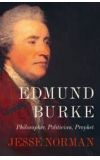
19 May 2013 23:45:12
Is this book about Edmund Burke or Jesse Norman? Should this review be about the "first modern conservative" or the man who might yet succeed David Cameron?
I merely ask, as the pre-publicity for this biography-cum-manifesto has focused almost entirely on the author. With good reason: Norman is one of the most eclectic and interesting MPs in the current parliament (although it is not particularly hard to stand out among the present crop).
Personable and thoughtful, he also has a cavalier streak, such as his decision to lead the largest Tory rebellion over, of all things, House of Lords reform. The prime minister was so furious he gave him a verbal head-butt in the corridor. But only a few weeks ago reconciliation was engineered, with Norman invited into a reshuffled Downing Street policy unit. He repaid the debt by defending the public spirit of Old Etonians.
Burke is the role model for Norman and for his breed of conservatism. It is not dissimilar to Cam's big society – the vaguely formulated idea that communities would be enhanced by more volunteering and genteel social responsibility. Norman calls it "social value", in which tradition, the non-belligerent practice of religion, duty and "modesty" are brought to the fore. Public service is beneficial to all concerned. "Thus people who regularly give money, time or support to others enjoy better physical and mental health, have lower levels of depression and suicide and have increased longevity, compared to those who do not."
According to Burke, property rights are essential to a "Ciceronian" virtuous society, while egalitarianism is just another manifestation of statist interference. In Burke's world (and Norman's too) it matters less who holds the power, but how it is exercised.
This absorbing book gathers pace, and relevance, as it goes along – an important contribution to the annals of conservative thought. While the first half is a more conventional historical/chronological account, it is in the second section that the author breaks new ground, as he focuses on Burke's place as a thinker. Navigating through Locke, Hobbes, Rousseau and more, Norman is adept at locating his subject. He admits that Burke's political career, with only two years holding public office, "was largely one of failure". As his writings became more vexed, his public standing suffered. He was prone to inconsistency, and self-righteousness. "He could be bitter, obsessive, occasionally even vindictive."
Burke was considered deeply unfashionable for more than a century after his death. By the 20th century, however, he began to be "pressed into service on numerous occasions", wrongly co-opted by various branches of political thought, the author contends. Both liberals, with their emphasis on individual liberty, and McCarthyite right-wingers, with their abhorrence of totalitarianism, have tried to embrace him.
He is not a libertarian or liberal, but a conservative. Neither is he a neoconservative – the practitioners in the Iraq war failed to understand the "temper" of the people (in the original sense of the word). Nor is he an American theoconservative, with its attendant claims to moral superiority.
Thus Burke could defend the American revolution, prosecute Warren Hastings and the bling-merchants of the East India Company, while railing against the slave trade, the opium trade and the dangers of the mob rule and ideological hubris of the French Jacobins. As an Irishman who sought to proclaim his Englishness, Burke was keen to assimilate but was courageous in defending Catholic rights. "At a time when religious toleration was still a highly contentious subject, he argued that all the major religions were the products of custom, tradition and 'long and prescriptive usage'," the author writes.
Norman insists that Burke's stock has soared so much that he is a valuable point of reference for Team Cam. "It is Burke now, more than two centuries after his death, who offers the most radical and compelling analysis of what has gone wrong, and who points the way to sources of possible recovery." He may wish it to be so. I am not convinced that 18th-century noblesse oblige – or Dave's Old Etonian chums – provide the best route out of the mire.

